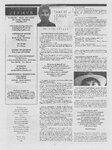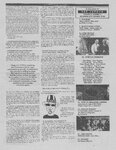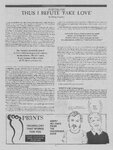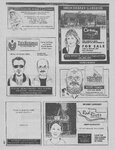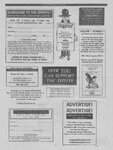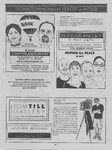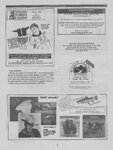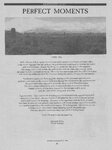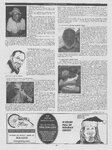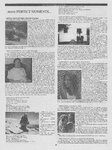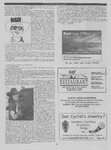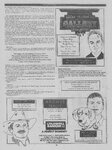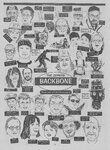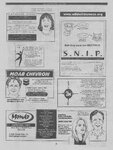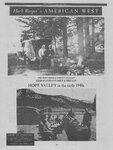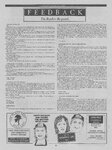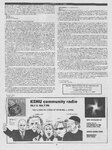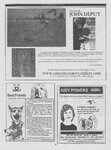| OCR Text |
Show SAVED BY AN ENEMY An improbable ‘perfect moment’ in the midst of a living hell By Amatetsan with an introduction by Terry Tempest Williams It was one year ago, that I sat down with Amatetsan and listened to her story as a woman soldier. Iwas stunned. Here was this beautiful, compassionate woman with fire in her eyes telling me about a war I had never heard of in a country I could not pronounce. This was the depth of my ignorance. Eritrea. It was a war over boundaries, land and sovereignty between Eritrea and Ethiopia in Africa’s Cape Horn. Fought in the 1990's, 100,000 individuals were left dead. We hear about. child soldiers, boys from Sierra Leone and the Congo. Ishmael Beah’s bestseller, “A Long Way Gone,” is a testament to the brutality waged against drugged children to fight the war of despots. But we rarely hear about girl soldiers and the plight of women carrying guns and using them. This is Rozina’s open wound tale and as I learn more from her memotr, piece by piece, she draws me into an abyss of darkness. Why do we continue to reenact violence against each other. And is the Jungian psychologist, James Hillman right when he says that as humans we have “a terrible love of war?” Eritrea and Ethiopia are close to starting yet another bloody conflict over the treaty that drew a new border by the United Nations. Both nations have violated aspects of this treaty. But diplomacy matters before unnecessary violence erupts once again.. The Bush administration is “cozy” with Ethiopia. Etitrea is a port across from the Middle East. The words “oil” and “access to oil” comes to mind, once again. Why should this issue, this story, matter to readers of the Canyon Country Zephyr? Because I believe awareness The winter sun was setting, making long shadows against the buildings. The target of the guerilla operation was an Eritrean man who had previously surrendered to the Ethiopians. He betrayed us by informing the enemy about our underground operations and hiding places. As a result, fighters were captured, and civilians suddenly faced danger. Our leaders scrambled to find the whereabouts of the traitor. After they got the information from the Ethiopian informants, they gave it to the leaders of our group. They carefully planned the mission and communicated with us secretly. As the traitor returned home we aimed to shoot him on his doorstep. We always hoped we could accomplish the mission with one bullet and minimize the casualties, but it did not always happen. In this case, I heard a shot. Then rapid shooting broke out and I knew we had been discovered by our enemies. Panicked Townspeople came toward me. They were running for their lives. Women carried their children in their hands to keep them from being shot in the back. Many were bleeding. Some collapsed on the sidewalk. Wherever people could find shelter, they hurried inside and locked the doors. The situation quickly went out of control and the street became a battleground. I saw the Ethiopian military behind us, shooting indiscriminately. I did not see my ELF comrades. getting the blood of Iraq is on all of our hands. of this chaos, I I made a sharp right turn to separate myself from the crowd and found my- It is a testament to Jim Stiles that he self on a residential street, panting and alone. The wind whistled between the has chosen to publish this story, “Saved | By An Enemy.” In the middle tarted running with the other civilians. needed to disappear. I tried to blend in with the people, walking faster and leads to responsible actions. We, too, are a nation at war. We seem to keep for- | buildings, but I did not feel it. When I It reminds us we do not | live in a desert of concern, but rather, we belong to a global consciousness tha says the pain carried by one human being belongs to all of us. Amatetsan is still a | | me. He was about thirty years old:and | had a pistol in his belt. He was alert | and focused, watching my hands and face. The stranger walked closer and warrior, only this time, she is a warrior o, peace who cares enough to share her story of war and redemption with all of us. Terry Tempest Williams _ acknowledged me. Behind me, I heard | voices, yelling in Amharic, “Catch her! | Catch her!” I pepeciss to be shot in the The wind of the highlands of Eritrea blew hard that January afternoon in 1977. I was a seventeen year old girl on assignment in Asmara with the urban fighters of the ELF. Cold gusts of wind pushed and pulled people on the street and made my skin crack and bleed. Unlike most women who wore a traditional dress, I wore long pants with a white shawl, but I had to hang on tight to keep it around me. Eritrean civilians were the backbone of the fight for liberation. They were courageous and determined to win independence for our country. In the cities, they. secretly housed, fed and transported us. When the urban fighters like me sneaked in from the villages, they went to civilian houses to wash and get the lice out of their hair. The clothing, jeway and lipstick I wore that day came from one family and helped me look like a city girl. | back. I was about to pass the stranger when he took out his pistol and grabbed me by the arm. He pulled me toward him and turned me around. In the process, he must have felt my pistol on my hip, but he said nothing. Suddenly, I faced six soldiers, running toward me with their knives drawn. I was trembling with fear. One of the men fired questions at me. “What are you doing here? Are you one-of the bandits? Were you shooting, too?” Before I could speak, he asked more questions. I could not utter one word. I was ter- In the process, he must have felt my pistol on my hip, but he said nothing. Suddenly, I faced six soldiers, running toward me with their knives drawn. I was trembling with fear. rified. Then the stranger spoke. “She is my girlfriend,” he said in a calm voice. “She was coming to see me.” The soldiers seemed disappointed at his reply and lost interest in me. Five of them dispersed down the street, thinking I was not one of the shooters. They banged with their fists on the cement walls that surrounded the houses, hoping to stumble on one of the shooters. I was shocked to be alive. It seemed so unreal. One soldier stayed and asked more questions. The stranger didn’t answer. He put his pistol back in his belt and took out a wallet to show his ID “Tam with the airborne division,” he explained. “I am leaving, and that Jeep is mine.” “What is your rank, comrade?” the soldier asked, standing close to us and poking his At about 5:30 p.m., I was positioned as an ELF lookout on the street. I was waiting for other freedom fighters to carry out a mission before the curfew began at seven o’’clock. Everyone in the urban guerilla group knew his job and how to respond to any circumstances. At about 5:30 p.m., I was positioned as an ELF lookout on the street. I was waiting for other freedom fighters to carry out a mission before the curfew began at seven o’’clock. Everyone in the urban guerilla group knew his job and how to respond to any circumstances. Once a job was completed, whether we succeeded or not, we knew to immedi- ately leave the scene. gun at our faces. I could smell the man’s sweat. “Moto-alka,” the stranger answered, still holding my arm .“I am the leader of one hun- dred men.” As the soldier studied the ID, he accidentally banged me with his gun. He did not apologize. He continued asking question. It took a long time, and I thought: Night curfew is near, and some of the wounded will bleed to death tonight. I might die like a homeless dog. I wished I had died when I was stricken with polio at the age of six, or drowned when J later jumped off the bridge to impress my friends. How sad my family will be if they find my body. It will be dragged through the street and thrown in a huge container of limestone water to decompose. I also thought about the stranger--how we might die together. I felt connected to him in some way. He noticed my pain and squeezed my arm as if to say, “Don’t collapse on me! We will be okay.” At last, the soldier dropped his gun from his shoulder and stepped back. In a very disrespectful voice, he told me to open my purse. I saw hatred in his eyes, and he grabbed the purse from me. He took out everything and threw it against me. Usually, I carried my pistol in my purse. But today, it had only a cigarette lighter, some coins, twenty burr (Ethiopian denomination) and a picture of a fashionable, white wom- an, holding a cigarette. To me, the woman in the advertisement looked modern, like I |

